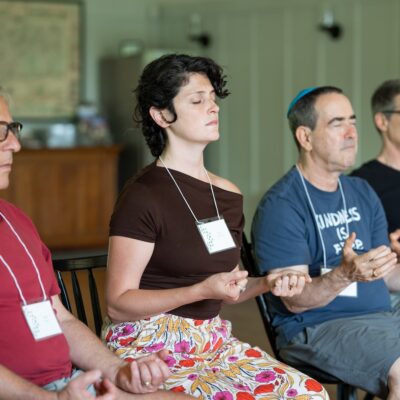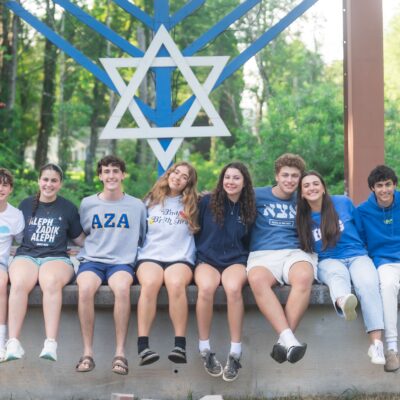Opinion
ISRAEL EDUCATION
It’s time to teach about the conflict: Here’s how
The need for Jewish educators to transform moments of uncertainty into educational opportunities has never been as pressing as it is today in the aftermath of Oct. 7 and the ongoing war. At the same time, educators who feel they lack a foundational knowledge base and cannot provide sufficient context for the complex times we are in may be overwhelmed when engaging in conversations about the conflict, or avoid them altogether.
As Jewish educators, it is our responsibility to develop the confidence and skills needed to explore the Israeli-Palestinian conflict with our learners. Educators in all settings need new skills to adapt to new realities and develop confidence in engaging with complex, fraught topics even when they are not content experts. Conflicts of Interest, a signature learning experience from The iCenter piloted over the course of 2023-2024, reimagines how to help educators do this effectively with their peers and learners.

A Conflicts of Interest’ cohort at The iCenter office in Chicago. Courtesy/The iCenter
The result of a year-long research process which began in 2021, Conflicts of Interest is organized around a set of core pedagogies, content areas and points of contention in the Israeli-Palestinian conflict. The program enables participants to gain confidence, core competencies and content knowledge they can use to bring meaningful conflict education to their classrooms and communities.
In the pilot implementation year, The iCenter facilitated four cohorts, each of which was surveyed by an external evaluator. Participants were asked to rate themselves on their perceived growth and change as a result of the program, including their confidence and skill in engaging learners in conversations about the conflict, and their ability to hold multiple perspectives when discussing the conflict. Results show measurable growth among participants in all cohorts, with large gains reported in every area measured.
Below are some insights gleaned through the evaluation process that can be useful to any organization looking to provide high-quality, effective professional development at this moment.
Learners’ relationships to Israel must be at the center of the experience.
A core philosophy at The iCenter is the importance of nurturing the relationships of North Americans and Israelis to Israel and to one another. This philosophy is a central component of Conflicts of Interest, where we aim to nurture the interrelationship between one’s lived experience and one’s knowledge acquisition.
Our participants’ relationships with Israel are central to the Conflicts of Interest experience, as we understand that they influence how each individual approaches any consideration of the Israeli-Palestinian conflict. The program focuses first and foremost on how each participant grows personally and navigates the nuances of their individual relationships with Israel, giving them space first as learners before developing their skills as educators. Indeed, nearly 85% of respondents found this approach to be “very” or “extremely valuable” and appreciated the time they got to be nurtured as learners. The nuanced and multi-faceted relationships of the participants themselves — in conversation and in collaboration — are what make the program experience all the more compelling.
For educator training, the balance between being a learner and practitioner is key.
Every participant in Conflicts of Interest comes wearing two hats: that of being a learner, there to deepen their own knowledge base and context with respect to the Israeli-Palestinian conflict, and that as a practitioner, looking to develop tools and skills to engage their respective learners in difficult conversations. Throughout the program, participants are reminded of these two goals. They are encouraged to approach each session and experience first and foremost as learners. Then, at the end of every session, participants are given the time and space to process and reflect on what and how they have learned — unpacking knowledge acquired, the methodologies used, and the skills being developed. They are then provided guidance in how to adapt and apply these learnings to their own settings.
Survey results indicate our success with this approach. The “pulling back the curtain” strategy was rated as one of the most effective parts of the program, enabling participants to translate their own learnings into practical applications. One respondent even remarked that, “pulling back the curtain to explain pedagogies felt useful, largely as a constant reminder that we were learning these things not just to gain content knowledge, but to find ways to teach it.”
Receptiveness is crucial for engaging in contentious conversations.
Receptiveness, the willingness and ability to engage with perspectives that differ from your own, is one of the core pedagogic approaches that guides Conflicts of Interest. We explicitly offer opportunities to practice receptiveness, as these tools help us better hear opposing perspectives when in conversation.
Our survey results indicate that this tool was among the biggest takeaways from the program. There was impressive growth in receptiveness when discussing the conflict, with participants’ self-ratings moving from moderate to high across all cohorts. According to the evaluator, “While some participants found [receptiveness] to be the hardest skill for them to acquire, most said they believed it was crucial in being able to converse about conflict.”
Curating multiple perspectives is critical for unpacking complexities.
Nowadays, there is a general consensus in the field of Israel education that engaging with multiple narratives, including those of various Jewish Israeli, non-Jewish Israeli, Palestinian, and other Arab nations, is essential, especially regarding the conflict. The challenge for educators, however, is how to curate these perspectives and help learners piece together a broader picture of our world with all its complexities. Conflicts of Interest provides participants with ample opportunities to practice expanding their fields of vision through a variety of multiple narratives, encouraging them to apply receptiveness tools and deepen their awareness of perspectives that may oppose their own. We then bring to the surface our own curation process and, in doing so, help participants make explicit connections to their own practice.
In our evaluation, the most frequently mentioned takeaway for participants was the value of learning multiple perspectives of historical and current events. On participants’ self-ratings on their ability to hold multiple perspectives when discussing the conflict, we again found impressive growth (from moderate to high) across all cohorts. Many respondents mentioned that they appreciated the value of exploring Arab and other narratives, which they felt enhanced their understanding of the complexities of the current conflict, and were “impacted by the facilitation of many different narratives: the modalities, the media used and the language chosen.”
Equipping educators with tools and skills for facilitating difficult conversations will remain a priority long after the war ends. While Conflicts of Interest has proven to be timely in this moment, the foundational principles upon which this program was built prior to the war are timeless and more important than ever.
As one participant, reflecting on their experience in the program, said: “My biggest takeaways are knowing that it’s okay not to know everything and that conflict should not be avoided; the zone of discomfort is where learning and growth occur, and it’s necessary to approach conflict education with multiple lenses in a way that considers multiple perspectives and narratives.”
With increased confidence, expanded content knowledge and deepened pedagogic skills, educators can become far more proficient to engage in conflict education, without needing to be an “expert” in the field. They can then return to their own learners and challenge themselves to make engaging with the Israeli-Palestinian conflict a standard element of their educational offerings.
Ari Feinstein leads The iCenter’s Conflicts of Interest program, which is now accepting applications. Mikayla Laufer is the director of customer relationship management and data analysis for The iCenter.

 Add EJP on Google
Add EJP on Google









